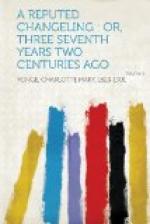“Most true, sir; but let me say one more word. I fear, I greatly fear, that all young spirits brook not compulsion.”
“That means, they will not bow their stiff necks to the yoke.”
“Ah, sir! but on the other hand, ’Fathers, provoke not your children to wrath.’ Forgive me, sir; I spoke but out of true affection to your son, and the fear that what may seem to him severity may not drive him to some extremity that might grieve you.”
“No forgiveness is needed, madam. I thank you for your interest in him, and for your plain speaking according to your lights. I can but act according to those vouchsafed unto me.”
“And we both agree in praying for his true good,” said Mrs. Woodford.
And with a mutual blessing they parted, Mrs. Woodford deeply sorry for both father and son, for whom she had done what she could.
It was her last interview with any one outside the house. Another attack of spasms brought the end, during the east winds of March, so suddenly as to leave no time for farewells or last words. When she was laid to rest in the little churchyard within the castle walls, no one showed such overwhelming tokens of grief as Peregrine Oakshott, who lingered about the grave after the Doctor had taken his niece home, and was found lying upon it late in the evening, exhausted with weeping.
Yet Sedley Archfield, whose regiment had, after all, been sent to Portsmouth, reported that he had spent the very next afternoon at a cock-fight, ending in a carouse with various naval and military officers at a tavern, not drinking, but contributing to the mirth by foreign songs, tricks, and jests.
CHAPTER XII: THE ONE HOPE
“There’s some fearful tie
Between me and that spirit world, which God
Brands with His terrors on my troubled mind.”
KINGSLEY.
The final blow had fallen upon Anne Woodford so suddenly that for the first few days she moved about as one in a dream. Lady Archfield came to her on the first day, and showed her motherly kindness, and Lucy was with her as much as was possible under the exactions of young Madam, who was just sufficiently unwell to resent attention being paid to any other living creature. She further developed a jealousy of Lucy’s affection for any other friend such as led to a squabble between her and her husband, and made her mother-in-law unwillingly acquiesce in the expediency of Anne’s being farther off.
And indeed Anne herself felt so utterly forlorn and desolate that an impatience of the place came over her. She was indeed fond of her uncle, but he was much absorbed in his studies, his parish, and in anxious correspondence on the state of the Church, and was scarcely a companion to her, and without her mother to engross her love and attention, and cut off from the Archfields as she now was, there was little to counterbalance the restless feeling that London and the precincts of the Court were her natural element. So she wrote her letters according to her mother’s desire, and waited anxiously for the replies, feeling as if anything would be preferable to her present unhappiness and solitude.




